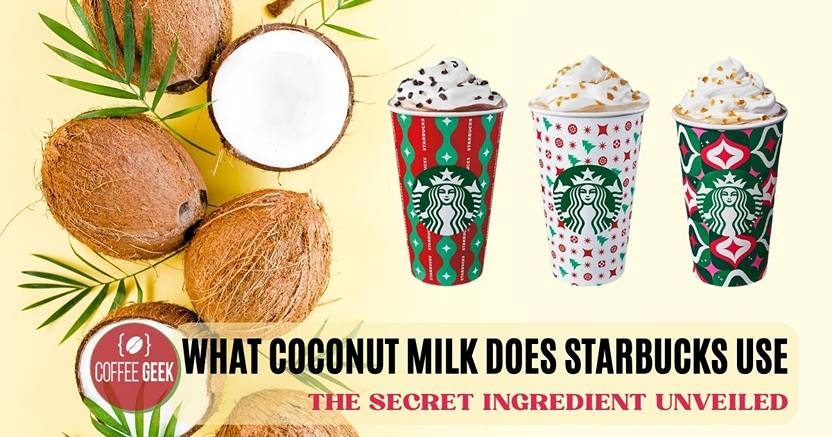Coconut milk has become a popular non-dairy alternative, with coffee shops such as Starbucks offering it as an option to cater to those with dietary restrictions or simply seeking healthier alternatives.
At Starbucks, the choice of coconut milk raises questions about its brand, nutritional composition, and impact on consumer health.
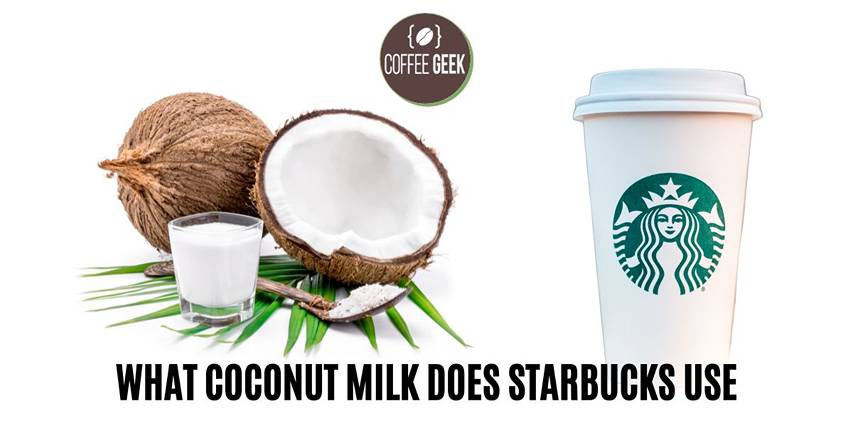
Starbucks uses a specific brand of coconut milk that is a blend of water, coconut cream, and several other ingredients like additives and emulsifiers.
The nutritional profile of Starbucks’ coconut milk reveals that it is not as wholesome as it may seem due to the presence of ingredients like carrageenan and corn dextrin, which can lead to inflammation and digestive issues.
Despite these concerns, Starbucks also offers other non-dairy milk alternatives for customers to choose from. What coconut milk does Starbucks use? Let’s find out!
Key Takeaways
- Starbucks offers coconut milk as a non-dairy alternative in their beverages
- The brand of coconut milk used by Starbucks contains additives and emulsifiers, raising health concerns
- Other non-dairy milk options are available at Starbucks for customers with dietary restrictions
- What Coconut Milk Does Starbucks Use?
- Specific Brand of Coconut Milk Used by Starbucks
- Nutritional Composition of Starbucks' Coconut Milk
- Ingredients Found in Starbucks' Coconut Milk
- Health Implication of Starbucks' Coconut Milk
- Starbucks' Other Non-Dairy Milk Options
- Adapting Starbucks’ Drinks with Coconut Milk
- Coconut Milk and Dietary Restrictions
- Conclusion
- Frequently Asked Questions
What Coconut Milk Does Starbucks Use?
As a Starbucks customer, you might be aware that this popular coffee chain provides several non-dairy milk options for those seeking healthier alternatives.
One such option is the refreshing and creamy coconut milk. But, have you ever wondered what type of coconut milk Starbucks uses in their beverages?
According to various sources, Starbucks uses a barista coconut milk specially made for blending with coffee drinks. This coconut milk differs from the traditional coconut milk often found in cans.
Starbucks’ version contains some additives like gums, preservatives, natural flavors, and carrageenan (a seaweed-derived ingredient that can be inflammatory).
It is essential to note that the coconut milk used at Starbucks is fortified with Vitamin A and Vitamin D2, providing additional health benefits.
While you may assume that the coconut milk Starbucks uses is all-natural, it contains food additives and emulsifiers that differentiate it from the traditional coconut milk made simply with coconuts and water.
However, Starbucks chooses this specific coconut milk blend for its benefits like consistency, flavor, and how it interacts with coffee and other ingredients.
To summarize, the coconut milk used by Starbucks is a custom-made blend designed for use in various beverages, such as lattes, smoothies, or refreshing iced drinks.
Though it contains some additives and may not be labeled all-natural, Starbucks’ coconut milk provides a tasty and creamy non-dairy option for customers with different dietary preferences or those seeking a unique flavor experience.
Specific Brand of Coconut Milk Used by Starbucks
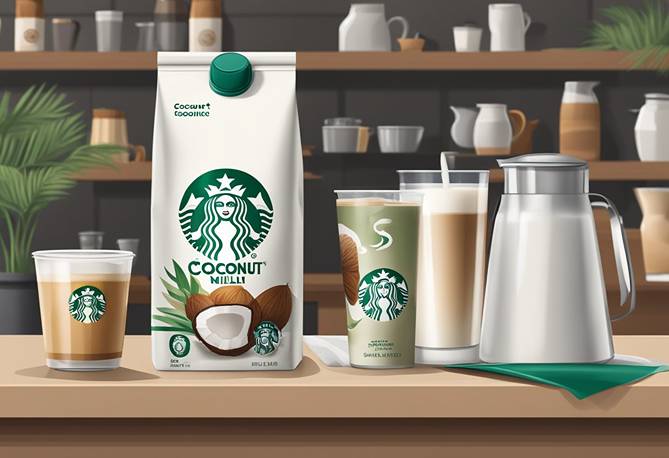
When it comes to the coconut milk used by Starbucks, they have chosen a specific brand that meets their high standards and offers their customers a great non-dairy milk option.
This brand is their very own Single Origin Sumatra Coconut Milk, which they source directly from the tropical island of Sumatra in Indonesia.
Sumatra is known for its lush, fertile soil, making it an ideal location for growing high-quality coconuts.
The Single Origin Sumatra Milk Coconut is created by using only the most premium coconuts, which helps ensure a creamy, smooth, and delicious taste.
This coconut milk is an excellent alternative for those who are lactose intolerant, vegan, or simply prefer a dairy-free option in their beverages.
It’s important to note that, like many other coconut milk brands, Starbucks’ Sumatra Coconut Milk does contain some not-so-natural additives, such as gums, preservatives, natural flavors, and carrageenan.
Carrageenan, in particular, is a controversial seaweed-derived additive that is thought to be inflammatory.
However, these additives are generally considered safe and are commonly found in many other coconut milk products.
In conclusion, the coconut milk used by Starbucks is their exclusive Single Origin Sumatra Coconut Milk which offers a smooth and creamy texture and a superior taste that reflects the coffee giant’s commitment to quality.
Opting for this dairy alternative in your Starbucks beverages allows you to enjoy a rich, delicious, and vegan-friendly option while still experiencing the classic Starbucks taste that you know and love.
Nutritional Composition of Starbucks’ Coconut Milk

Starbucks uses a Single Origin Sumatra Milk Coconut in their beverages. This specific coconut milk is made with single-origin coconuts sourced from Sumatra, an island in Indonesia.
It has a naturally creamy consistency, making it an ideal addition to cold or iced drinks.
When considering the nutritional composition of Starbucks’ Coconut Milk, it is important to note that it contains 80 calories per cup serving at Starbucks. In a 16-ounce grande cup, the coconut milk contributes 17 grams of sugar and 180 calories.
This is significant considering the daily recommended maximum intake of added sugar for men is 36 grams and 150 calories, while for women it’s 25 grams and 100 calories.
In terms of fats, this coconut milk has a higher fat content compared to some other non-dairy milk options, offering a rich and creamy texture.
However, this type of fat is mostly medium-chain triglycerides (MCTs), which are known for their potential health benefits.
Here’s a breakdown of the main nutrients in Starbucks’ Coconut Milk:
- Calories: 80
- Fat: Specific details not available in search results
- Saturated Fat: Specific details not available in search results
- Carbohydrates: Specific details not available in search results
- Sugars: 10 grams (in a 12oz. tall caffe latte)
- Protein: Specific details not available in search results
- Vitamins and Minerals: Rich in vitamin C, iron, and magnesium
It’s worth noting that as a plant-based milk alternative, coconut milk is naturally lactose-free and suitable for those with lactose intolerance or on a dairy-free diet.
Moreover, it is rich in essential vitamins and minerals, such as vitamin C, iron, and magnesium, making it a nutrient-dense option for adding to your beverages.
Remember to keep your preferences and dietary restrictions in mind when choosing a milk alternative at Starbucks.
Ingredients Found in Starbucks’ Coconut Milk
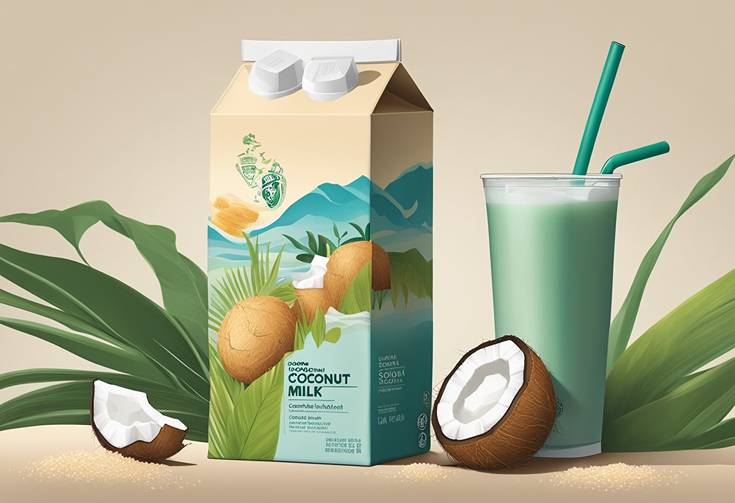
Starbucks offers a variety of non-dairy milk alternatives, and one of them is their creamy, refreshing coconut milk.
But have you ever wondered what ingredients are actually present in Starbucks’ version of coconut milk?
Below is a brief overview of the contents:
- Coconut cream: As expected, the primary ingredient in Starbucks’ coconut milk is coconut-cream. This creamy base is derived from the solid part of the coconut, offering a rich and slightly sweet taste.
- Coconut water concentrate: In addition to the cream, Starbucks also uses coconut water concentrate in their formulation, which adds a natural and subtle sweetness to the milk.
- Cane sugar: to provide additional sweetness, Starbucks gets a small amount of cane sugar into their coconut milk.
- Sea salt and natural flavor: These ingredients help enhance the taste and bring out the subtle notes of flavor in the coconut milk.
Starbucks’ coconut milk also contains several additives and emulsifiers to maintain its texture and prevent separation.
Some of these additives include:
- Xanthan gum and guar gum: These natural polysaccharides derived from plant sources are used to thicken and stabilize the milk’s consistency, ensuring even distribution among your beverages.
- Corn dextrin: This ingredient acts as a binding agent and helps to improve the texture of the milk.
One of the more controversial ingredients found in Starbucks’ coconut milk is carrageenan. Carrageenan is a seaweed-derived additive that has sparked debates due to its potential inflammatory properties.
Additionally, Starbucks’ coconut milk contains gellan gum, another stabilizer that helps maintain the milk’s smooth consistency.
It is important to note that while real coconut milk is typically made from coconuts and water, the version used by Starbucks includes a variety of food additives, such as emulsifiers and preservatives.
This helps maintain the product’s shelf life and texture, but it also means that Starbucks’ coconut milk may not be considered “all-natural.”
In summary, Starbucks’ coconut milk includes a blend of coconut-derived ingredients, natural flavors, and additives to create a functional non-dairy milk alternative for customers seeking healthier options in their beverages.
Health Implication of Starbucks’ Coconut Milk
When considering Starbucks’ non-dairy alternatives, it is essential to be aware of the health implications associated with their coconut milk.
While coconut milk in general is a popular choice for its refreshing taste, it’s important to be cautious of the additives and nutritional contents in the product used by Starbucks.
A grande cup of Starbucks’ coconut milk contains 17 grams of sugar and 180 calories. For men, the recommended maximum daily intake of added sugar is 36 grams and 150 calories.
For women, it is 25 grams and 100 calories. Excessive sugar intake can negatively impact weight loss goals and overall heart health.
The type of coconut milk used at Starbucks also contains additives such as gums, preservatives, natural flavors, and carrageenan.
Carrageenan is a controversial seaweed-derived additive that is thought to cause inflammation and bloating. These additives may not align with your health goals, especially if you are seeking an all-natural option.
On a positive note, Starbucks fortifies its coconut milk with vitamins A and D2, which can support your immune system and overall health.
However, this milk alternative may not offer much in terms of protein or other essential minerals, so it’s important to ensure that you are meeting your nutritional needs through other foods in your diet.
To make a well-informed decision on whether Starbucks’ coconut milk is suitable for your health and dietary preferences, consider factors such as sugar content, additives, and overall nutrient contributions.
By doing so, you can ensure that your choice supports your long-term wellness
Starbucks’ Other Non-Dairy Milk Options
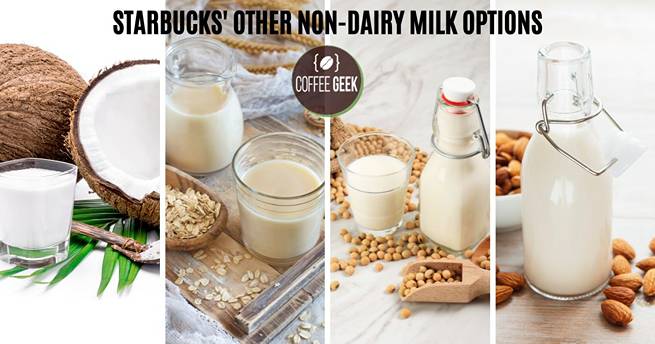
In addition to coconut milk, Starbucks offers a variety of non-dairy milk options to cater to customers with different preferences and dietary needs. These plant-based milk alternatives provide lactose-free and dairy-free options for your favorite Starbucks beverages.
Almond Milk is a popular non-dairy alternative made from almonds and water.
Starbucks uses its own brand of almond milk, which is slightly sweetened and formulated to work well in hot and cold drinks.
This option is a good choice if you prefer a nutty flavor and lower calorie content.
Soy Milk has been a staple non-dairy milk option at Starbucks for years.
This plant-based milk is made from organic, non-GMO soybeans and is unsweetened, offering a creamy texture and subtle flavor. It works well in various drinks, from lattes to frappuccinos.
Oat Milk is a newer addition to Starbucks’ non-dairy milk lineup, gaining popularity for its rich, creamy texture and neutral taste.
Oat milk is an excellent choice for those looking for a milk alternative with a lower environmental impact.
When ordering at Starbucks, you can easily swap out dairy milk for any of these non-dairy alternatives to enjoy your preferred flavor profile and meet your dietary needs.
Whether it’s almond milk, soy milk, or oat milk, these plant-based options are sure to enhance your Starbucks experience.
Adapting Starbucks’ Drinks with Coconut Milk
As a coffee lover seeking a dairy-free alternative, you might wonder how to customize your Starbucks drinks with coconut milk.
Rest assured, Starbucks offers a variety of options to adapt your favorite beverages, retaining their natural flavors and delightful sweetness.
First, let’s talk about the basics. Whenever you order a latte, which traditionally comes with whole milk, you can easily substitute it with coconut milk.
This will give your drink a creamier texture and a slight tropical twist. For instance, the Vanilla Bean Coconut Latte is a perfect example of blending espresso, natural vanilla, and coconut milk for a delicious caffeine fix.
Starbucks also features a few signature drinks that showcase the flavors of coconut milk. The Dragon Drink blends their Mango Dragonfruit Refresher with coconut milk for a fruity and smooth concoction.
Similarly, the popular Pink Drink combines their Strawberry Açaí Refresher with coconut milk, offering a delightful berry beverage with a hint of tropical bliss.
For those with a sweet tooth, Starbucks offers indulgent options as well. The Coconutmilk Cascara Latte incorporates cascara syrup with espresso and steamed coconut milk, resulting in a beverage that’s both dairy-free and delightfully sweet.
Another delicious treat is the Caramel Coconut Crème Pie Frappuccino, which blends coconut milk, caramel sauce, and graham cracker crumbs with ice, creating a delectable dessert-like drink.
Here are some popular Starbucks beverages customized with coconut milk:
- Vanilla Bean Coconut Milk Latte
- Dragon Drink
- Pink Drink
- Coconutmilk Cascara Latte
- Caramel Coconut Crème Pie Frappuccino
Remember, you can always ask your barista for other ways to customize your drinks with coconut milk. They are well-equipped to help you explore a world of dairy-free alternatives in your coffee adventures.
Coconut Milk and Dietary Restrictions

As a lactose-intolerant individual, you may struggle to find milk alternatives that cater to your dietary needs.
Thankfully, Starbucks offers coconut milk as a non-dairy option, making it suitable for those with lactose intolerance or dairy allergies. Coconut milk provides a creamy and refreshing taste, making it an excellent choice for your favorite beverages.
If you’re looking for vegan-certified options, the coconut milk used by Starbucks will meet your requirements. This dairy-free alternative ensures that those following a vegan diet can still enjoy their preferred drinks without compromising their lifestyle choices.
Moreover, the Coconut Single Origin Sumatra Milk used by Starbucks contains less calories and carbs than many other milk options, making it a healthy choice.
Concerned about all-natural ingredients? The coconut milk at Starbucks contains water, coconut cream, coconut water concentrate, and other natural ingredients.
However, it’s important to note that Starbucks’ coconut milk does contain some added sugar and stabilizers such as carrageenan, gellan gum, and guar gum.
In summary, Starbucks’ coconut milk caters to a variety of dietary restrictions, such as:
- Lactose-intolerant: A great non-dairy option for those with lactose intolerance.
- Allergies: Suitable for individuals with dairy allergies.
- Vegan-certified: Ideal for those following a vegan diet.
- All-natural: Made from natural ingredients, although it contains some added sugar and stabilizers.
- Healthy: Lower in calories and carbs compared to some other milk alternatives.
When considering your next Starbucks order, keep these factors in mind to find the most suitable choice for your particular dietary needs.
Conclusion
Starbucks has become well-known for its wide variety of drink options, catering to different dietary needs and preferences.
When it comes to coconut milk, Starbucks uses a specific kind that is tailored to complement their beverages.
The coconut milk that Starbucks uses the Starbucks Single Origin Sumatra Coconut Milk.
This particular type of coconut milk is sourced from the Indonesian island of Sumatra, known for its rich and high-quality coconut produce.
Starbucks coconut milk contains a blend of coconut meat and water, and it makes Starbucks coconut milk sweetened with cane sugar to enhance its flavor.
It is certified vegan, making it a popular alternative to dairy milk for those who prefer plant-based or lactose-free options.
Among its ingredients, Starbucks coconut milk contains tricalcium phosphate and vitamin A palmitate, ensuring that it is both nutritious and enriching for a variety of drinks.
When used in a drink at Starbucks, this kind of coconut milk adds a distinct tropical flavor.
Whether in an iced coffee, an espresso drink, or other different drinks, it provides a creamy and smooth texture that many customers enjoy. For those looking to buy
Starbucks coconut milk, it’s important to note that while Starbucks does offer a retail version, the Starbucks version used in their locations across the United States may have a slightly different formulation to cater specifically to their beverage recipes.
Each serving of Starbucks coconut milk contains 17 grams of sugar, which is something to consider if consumed in large amounts or for those monitoring their sugar intake.
However, it still offers less sugar than some other milk alternatives. The coconut milk is sweetened to balance the flavors in various Starbucks drinks and to ensure that customers can enjoy Starbucks drinks with the familiar taste and quality they expect.
Final thoughts on Starbucks coconut milk: it’s a flavorful, vegan-friendly option that complements a wide range of Starbucks beverages.
It’s made from high-quality coconut meat and water, sourced from the Indonesian island of Sumatra, and sweetened to enhance its taste.
While Starbucks coconut milk isn’t available for purchase in the same form as used in stores, they do offer a retail version, and you can always enjoy it in many of their delicious drinks.
As a participant in the Amazon Services LLC Associates Program, Starbucks continues to explore ways to provide its customers with high-quality, versatile beverage options.
Frequently Asked Questions

What are the ingredients in Starbucks coconut milk?
The ingredients in Starbucks’ coconut milk are water, cream – coconut, sugar cane, and other additives, including gums, preservatives, natural flavors, and carrageenan, a seaweed-derived additive that can be controversial due to its potential inflammatory properties. It’s also fortified with Vitamin A and Vitamin D2.
Is the coconut milk at Starbucks unsweetened?
The coconut milk at Starbucks contains added cane sugar, making it a sweetened option. Keep in mind that Starbucks’ coconut milk has more sugar than its unsweetened counterparts available at grocery stores.
What are the nutritional facts of Starbucks’ coconut milk?
A typical serving of 8 fluid ounces (240 ml) of Starbucks’ coconut milk contains 130 calories, 7 grams of fat, 17 grams of carbohydrates, and 1 gram of protein. It also has various micronutrients, including Vitamin A and D2, due to fortification.
Where can I purchase Starbucks’ Sumatra coconut milk?
Starbucks’ Sumatra coconut milk is exclusively used in Starbucks stores, which makes it unavailable for retail purchase.
If you want to try the taste of Starbucks’ coconut milk, your best option is to order a beverage using this milk at your local Starbucks store.
Is the Starbucks coconut milk a healthy option?
While Starbucks’ coconut milk is a non-dairy alternative, it contains added sugar and various additives such as gums, preservatives, and carrageenan, which might cause some health concerns.
However, it still offers a dairy-free option for those who prefer plant-based milk or have lactose intolerance.
How does Starbucks’ coconut milk taste in lattes?
The coconut milk used by Starbucks is known for its creamy and refreshing taste.
It adds a tropical flavor to their lattes and works well with various beverages, such as Pina Colada Tea Coconutmilk Creme Frappuccino, Vanilla Bean Coconut Milk Latte, and Dragon Beverage.
Many customers find the taste enjoyable for both hot and cold drinks.

